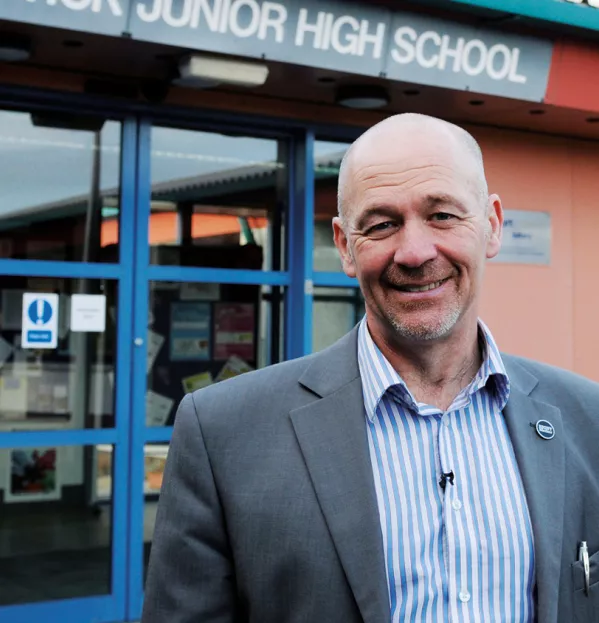Pupil voice isn’t blether, but old habits die hard

Schools will never “get” children’s rights because the very idea makes them feel “threatened”. That’s what Tam Baillie, Scotland’s outgoing children’s commissioner, was told time and again when he first started in the role. And not by pub bores or anonymous internet trolls. People who worked with children - whether in social work or in other children’s services - often regarded schools, rightly or wrongly, as hierarchical little fiefdoms where children were largely expected to keep schtum, he says.
This was 2009, not 1909. Baillie had just taken over as commissioner. He wanted to help schoolchildren find their voice, but there was a steady stream of advice to suggest that he shouldn’t bother.
“There were people who said don’t expect engagement with schools in terms of children’s rights because they don’t get it, and even if they do, they see it as a threat to the authority of the school,” he recalls.
Baillie paid little heed and embarked on A Right Blether in 2010, the defining project of his eight years as commissioner, in an attempt to find out what made children tick. The consultation was not without controversy: tabloids accused him of frittering away hundreds of thousands of pounds garnering statements of the obvious. They also mocked the cartoon version of Baillie used in campaign literature as being a sign that the project was driven more by ego than altruism.
Pupils’ influence growing
As he considers his time in post, which will come to an end next month, Baillie feels vindicated. A Right Blether collected the views of 74,059 young people, which he says makes it the largest consultation of children ever undertaken in Scotland.
The feedback helped him to decide what his office’s four priorities should be in the years ahead. Many children did not feel that they were treated fairly in their learning, for example, so the commissioner challenged schools to take notice and make sure no one felt sidelined in the classroom.
However accurate the warnings might once have been about the conservatism of schools, Baillie thinks the biggest change they have undergone during his time in the job - having visited more than 200 schools - has been the growing influence of pupils.
There is still some way to go, Baillie concedes, but he adds: “There’s something amazing happening in Scottish schools right now, in terms of their preparedness to engage with children’s rights and give vent to the voice of children and young people.”
His office has analysed schools in deprived areas in which pupils genuinely influence what and how they learn. This “isn’t advisable just because it’s children’s rights and it’s in the United Nations Human Rights Council… there’s also an educational reason over and above that: this is a characteristic in schools serving poor areas, which do remarkably well.”
In practice, however, evidence suggests that forums such as pupil councils are often tokenistic and that teenagers have most influence over “softer” school issues, such as uniform. Recent University of Edinburgh research found that only about one in 20 pupils surveyed thought they had any say over the teachers that their school recruited.
That must change, believes Baillie; schools should “routinely involve children and young people in decision-making at all levels”, he urges. So far, there has been “more significant progress” in primary schools.
For all the “rhetoric” about Curriculum for Excellence marking a break from more didactic educational approaches, he sees old habits proving hard to shift, with continuing emphasis on the short period during which pupils cram for their Highers. “As long as we’ve got the secondaries being judged on their exam passes and outputs, I think that will forever drive the structure of secondary education,” he says.
After his fixed-term appointment finishes in May, he plans to continue working on issues affecting children, though he is yet to decide exactly what that might involve. His biggest hope for the future is that education and children’s services “pay a lot more attention to what’s happening in the adolescent brain”. He welcomes the increasing focus on the early years, but says there is more ignorance about this other period when, like in the early years, the brain undergoes significant change.
A Scottish Youth Parliament survey last year found that nearly half of young people suffering from mental health problems said that their place of learning did not provide a supportive environment. Baillie, however, has also seen encouraging signs that, after a long history of stigma and shame, teenagers feel far more able than even a few years ago to open up to classmates and teachers.
On one recent school visit, several pupils were introducing themselves to Baillie, when one girl, in front of the group, unexpectedly said, “My name is […] and I’ve got mental health problems.” No one batted an eyelid as she explained that the school had been “very, very supportive” and given her the confidence to be so candid.
“Wow - that would never have happened in my schooldays,” says Baillie.
You need a Tes subscription to read this article
Subscribe now to read this article and get other subscriber-only content:
- Unlimited access to all Tes magazine content
- Exclusive subscriber-only stories
- Award-winning email newsletters
Already a subscriber? Log in
You need a subscription to read this article
Subscribe now to read this article and get other subscriber-only content, including:
- Unlimited access to all Tes magazine content
- Exclusive subscriber-only stories
- Award-winning email newsletters